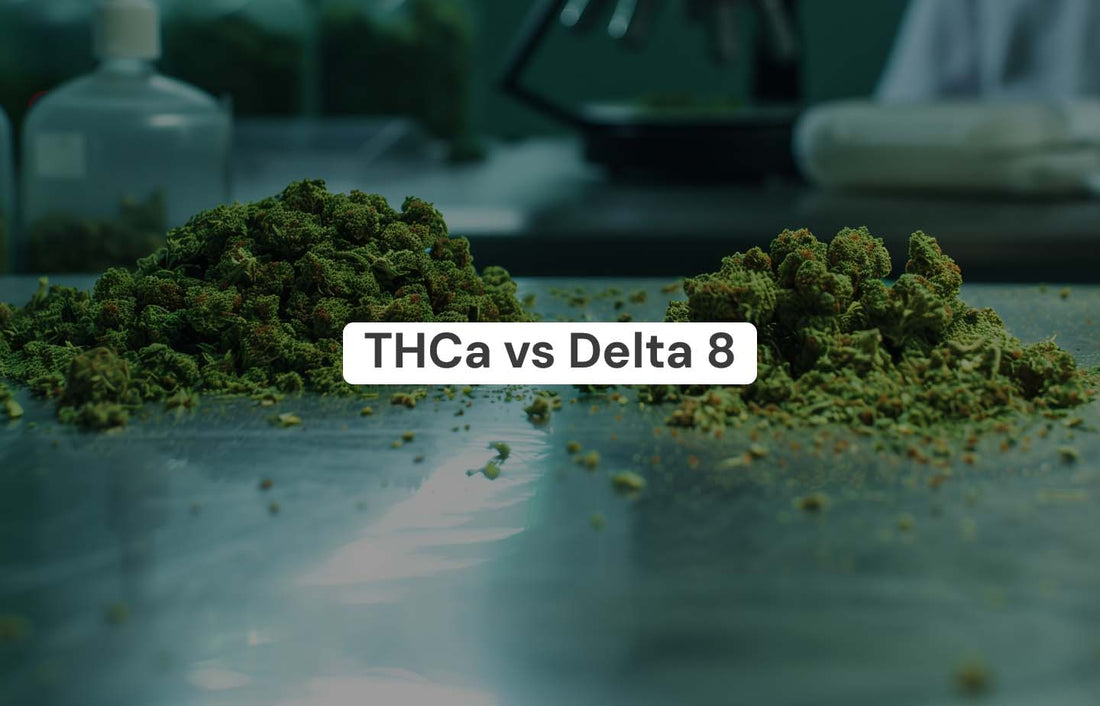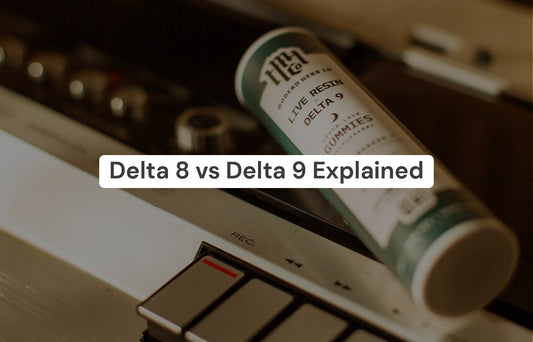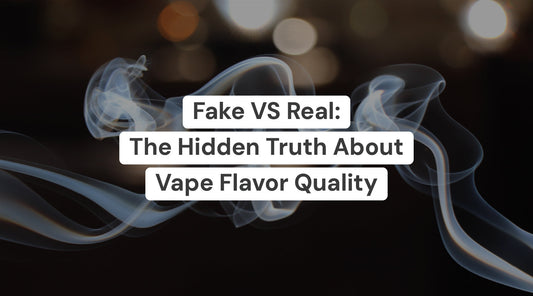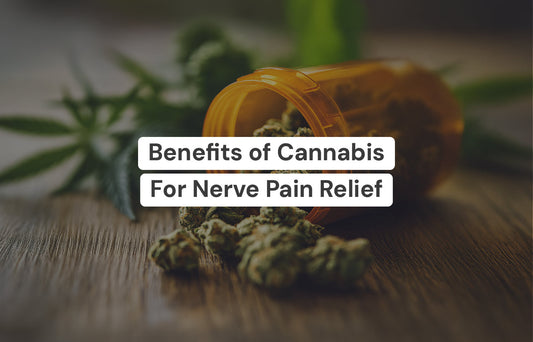
THCa vs Delta 8: Understanding the Differences
Comparing THCA vs Delta 8 THC, two compounds derived from hemp and cannabis plants, has become a focal point in recent discussions within the cannabinoid community. While both share a common origin, their individual characteristics, effects, and potential perks set them apart significantly. This article delves into the nuanced differences between THCA vs Delta 8, exploring their chemical properties, biological mechanisms, legal considerations, optimal dosing practices, and more.
Table of content
What is THCA?
Although THCA appears complicated at first, it is actually the precursor to Delta 9 THC, which is the main psychoactive ingredient in cannabis. As cannabis plants mature, their tetrahydrocannabinol compounds naturally transform into Delta 9, shedding their acidic nature. This transformation mirrors the process seen between THCA and Delta 8 THC, wherein both Delta 8 and Delta 9 can stem from THCA.
While THCA is a naturally occurring compound found in cannabis plants, it is not psychoactive and instead functions as THC's precursor. Through aging or exposure to heat, a process known as decarboxylation initiates the conversion of THCA into THC by removing a carboxyl group from the molecule.
Although research on THCA remains limited, some individuals opt to use it by incorporating raw cannabis into their regimen.
What is Delta 8?
How Is THCA Produced?
Raw cannabis buds are a great source of tetrahydrocannabinolic acid (THCA), a naturally occurring cannabinoid. The process of making THCA involves various methods, including natural growth and the application of THCA extract to compliant hemp flowers. Certain cannabis strains are known for having high concentrations of THCA, and growers have found ways to keep THCA from being converted into delta-9 THC by growing high-THC cannabis at low temperatures. In keeping with the entourage effect theory, some producers also decide to reintroduce terpenes into the process in order to increase the potency of the crystals. As stated in the 2018 Farm Bill, THCA flower is legal because it naturally occurs in hemp; however, each state may have a different legal position. The chemical transformation of THCA into THC that results in potential intoxicating effects occurs when it is heated or smoked.
The Best Way to Take THCA
Limited amounts of delta 8 THC, a psychoactive cannabinoid derived from marijuana plants, are found in nature. Unlike its more prevalent counterpart, Delta 9 THC, Delta 8 emerges as a minor cannabinoid within cannabis plants, sharing a similar structure but possessing distinct chemical characteristics. Through a molecular rearrangement process originating from Delta 9, Delta 8 has garnered attention as a legal alternative in recent years.
Popularly used through vaping or smoking, Delta 8 is also available in various other forms, such as tinctures and edibles. In some states and jurisdictions, it is still considered a controlled substance, even though it is federally legal in the US.
THCA, the precursor to THC, offers various methods to optimize its potential effects. Here are some recommended ways to use THCA flowers for optimal results:
- Vaping: Vaping THCA flower provides a flavorful and enjoyable experience by heating the flower without combustion, releasing inhalable vapor.
- Smoking: Smoking THCA flower is a popular method that closely resembles smoking regular cannabis, offering a familiar experience.
- Dabbing: Dabbing THCA flower provides a potent and quick buzz, suitable for those seeking a strong experience.
- Other Methods: Additional methods include using raw THCA flowers, using bongs or pipes, and exploring pre-made THCA products like tinctures, capsules, gummies, and oral sprays.
Each method offers distinct benefits and effects, catering to individual preferences and desired outcomes when using THCA flowers. To maximize the potential health benefits of THCA, picking a method that fits your goals and usage preferences is crucial.
How is Delta 8 Made?
Typically, hemp-derived CBD is converted to produce Delta-8 THC, a cannabinoid that is comparable to the more well-known Delta-9 THC. This conversion process involves the isolation of CBD from hemp plants, followed by a chemical reaction that transforms it into Delta-8 THC. After that, the Delta-8 THC produced can be utilized to make a variety of goods, including edibles, vape pens, tincture oils, and more. While Delta-8 THC offers users a comparable experience to Delta-9 THC with reportedly fewer adverse effects, it is essential to ensure that products are sourced from reputable and trustworthy vendors to guarantee quality.
The Best Way to Take Delta 8
When it comes to the best way to take Delta 8, several methods offer unique perks and potential effects. Vaping Delta-8 may provide immediate effects and high bioavailability, with the compound entering the system through the lungs, offering a quick onset of action. Tincure drops are another fast-acting option known for rapid absorption. For those who prefer edibles, Delta-8 gummies can be a choice, although they may have a slower onset compared to vaping. It's essential to consider personal preferences and desired effects when choosing how to use Delta-8, as individual responses may vary. Experimenting with different methods can help determine the most suitable way to enjoy the potential perks of Delta-8 based on personal preferences and desired outcomes. As a reminder, the potential effects of each method is not guaranteed and dependent on the individual.
Explore the Difference Between THCA Vs. Delta-8
Now that you have a foundational understanding of THCA vs Delta 8, it's time to delve into a detailed comparison of these two cannabinoids, examining their sources, effects, potency, legality, availability, and quality. Is THCA the same as Delta 8? While both compounds originate from cannabis, they differ in many ways.
Source
Cannabis sativa naturally contains two types of cannabinoids: Delta 8 and THCA. However, while THCA is readily available in its natural form, Delta 8 must be derived from CBD due to its limited natural supply. Although it's conceivable to breed cannabis plants naturally high in Delta 8, the prevalence of THCA products has diminished the incentive for such developments, ensuring a divergence in their sourcing for the foreseeable future.
Effects
For most users, the effects of delta 8 and converted THCA are indistinguishable. THCA and Delta 8 THC offer unique experiences, with THCA known for its non-psychoactive nature in contrast to the mild buzz associated with Delta 8 THC. Consequently, if you're seeking THC online, THCA is the preferred choice, while Delta 8 serves as a viable alternative, particularly if you find THC's effects too potent.
Potency
Is THCA stronger than Delta 8? The potency of each compound varies, with individual responses playing a significant role in determining perceived strength. In terms of potency, THCA surpasses delta 8 when converted into THC. While delta 8 may excel in specific aspects, such as nighttime support, THCA generally outperforms delta 8 in inducing potential psychoactive effects.
Legality
Both Delta 8 and THCA fall within similar legal frameworks, typically categorized under "industrial hemp" by the 2014 and 2018 Farm Bills, excluding delta-9 THC. The primary distinction lies in THCA's conversion into THC, although since THCA is not marketed in its converted form, this difference is largely negligible.
Availability
While both cannabinoids are available for purchase online in all 50 states, THCA has gained prominence, leading to potentially reduced investment in Delta 8 products over time. Consequently, delta 8 products may gradually become less available compared to THCA options.
In summary, while both THCA and Delta 8 offer unique attributes and potential benefits, understanding their distinctions enables informed decisions regarding cannabinoid usage.
THCA Vs. Delta-8 Potency Percentage
The primary distinction between THCa and Delta-8 lies in the potential effects they produce. Neither intoxication nor mental disorientation are brought on by unheated THCa because it is not psychoactive. Only upon heating does THCa undergo a conversion process, resulting in potential psychoactive effects. As such, THCa's potency pales in comparison to that of Delta-8 THC.
There is roughly 40% less potency in Delta-8 THC compared to Delta-9 THC. While Delta-9 THC products consistently exhibit higher potency and more pronounced desired effects, Delta-8 still delivers notable effects of its own.
To estimate THCa potency, one can multiply its value by 0.87, providing an approximation of the THC percentage post-heating. Legally, the maximum THC content for any product made from hemp is 0.3%.
Delta-8 Effects
Delta-8 THC is known for its unique potential effects on users, which can vary from person to person. Compared to Delta-9 THC, users often report feeling a milder psychoactive high. Some people discover that Delta-8 THC offers a more lucid experience with fewer side effects than Delta-9 THC. It is crucial to remember that everyone reacts to Delta-8 differently and that the effects can also vary depending on a person's tolerance level, dosage, and mode of usage. It is advisable to commence with a low dosage and progressively increase it according to individual experience, just like with any other cannabinoid product.
THCA Effects
One cannabinoid in raw cannabis that does not alone cause psychoactive effects is called THCA. When heated, THCA converts to THC, which is known for its psychoactive properties. Some users report potential supportive effects from using THCA. Individual reactions to THCA, however, can differ, and variables such as dosage, mode of usage, and tolerance levels may have an impact on the effects. It's important to approach THCA usage with caution and start with a low dose to assess how it affects you personally.
The Legality of THCA and Delta-8
THCA
THCA itself is legal in many states due to its non-intoxicating nature and presence in raw cannabis. However, the legal status of products containing THCA may vary depending on state regulations regarding cannabis derivatives.
Delta-8
The legal status of delta-8 THC, a cannabinoid derived from hemp, is complicated. Although the 2018 Farm Bill makes it legally permissible, some states have outlawed or severely restricted its sale because of worries about its effects. The FDA has issued warnings about the safety of delta-8 products, highlighting the lack of regulation and the potential for harmful additives.
Thus, while THCA is generally legal due to its natural occurrence in cannabis, the legality of delta-8 THC is more nuanced, with varying regulations across states and concerns about its safety and potential risks. To guarantee compliance with local regulations, users must be aware of the laws pertaining to these cannabinoids in their particular state.
Are THCA and Delta-8 Made Differently?
Yes, THCA and Delta-8 are produced differently due to their distinct chemical structures and properties.
THCA Production
The cannabis plant naturally produces tetrahydrocannabinolic acid or THCA. It is present in raw, unheated cannabis in high concentrations and is the acidic precursor to THC. The production of THCA is a natural part of the plant's metabolism, and it does not require human intervention beyond standard cannabis cultivation practices.
Delta-8 Production
Delta-8 THC, on the other hand, is typically manufactured through a chemical conversion process. It is found in only trace amounts in the cannabis plant, so producers often convert CBD, which is abundant in hemp, into Delta-8 THC. This conversion requires a laboratory setting and involves the use of catalysts, solvents, and specific reaction conditions to transform CBD into Delta-8 THC.
In summary, THCA is naturally occurring and is directly harvested from the cannabis plant, while Delta-8 THC is usually created in a lab through the chemical conversion of CBD.
Is THCA or Delta-8 Better?
No, we are unable to declare which is superior to the other; that is a decision that is left to you. The decision between THCA or Delta-8 is influenced by personal preferences, intended outcomes, and legal issues. Some may prefer the non-intoxicating nature of THCA, while others may appreciate the mild experience of Delta 8.
Cost Comparison Between THCA and Delta 8
The cost of THCA and Delta 8 THC products can vary based on factors such as potency, quality, and production methods. The Hemp Collect website, here is a price comparison between THCA and Delta-8 products available on the site:
THCA Products:
- Live Resin Delta 8 Vape Cartridge (Knockout): $27.00
- Live Resin Delta 8 Gummies (Knockout): $8.00 - $32.00
Delta-8 Products:
- Delta 8 THC Flower: $9.99 - $169.99
- Delta 8 THC Vape Cartridge: $39.99 - $54.99
- Delta 8 Gummies: $14.99 - $39.99
- Delta 8 Bars: $34.99
Based on the prices listed on The Hemp Collect website, the THCA products available are the Live Resin Delta 8 Vape Cartridge, priced at $27.00, and the Live Resin Delta 8 Gummies, ranging from $8.00 to $32.00. In comparison, the Delta-8 products offered include flowers ranging from $9.99 to $169.99, vape cartridges priced between $39.99 and $54.99, gummies priced from $14.99 to $39.99, and bars priced at $34.99.
Can THCA and Delta 8 Cause You to Fail a Drug Test?
Yes, both THCA and Delta-8 THC can trigger a positive drug test due to their chemical similarities to other THC compounds. Delta-8 THC may yield a positive result on tests designed for Delta-9 THC detection, as some tests lack the ability to differentiate between different THC variants. Factors such as test sensitivity, timing of usage, and test specificity can affect Delta-8 THC detection. Similarly, while THCA itself is non-psychoactive until heated, excessive use of THCA-containing cannabis products can lead to positive THC drug test results. Most current drug tests cannot distinguish between different THC forms, potentially resulting in positive tests even if only legal forms were used. To avoid potential positive results, individuals subject to drug testing should refrain from using any form of cannabis or THC whenever possible. Specific tests capable of differentiating between THC variants are available, offering more accurate results.
Is THCA Natural or Synthetic?
Raw cannabis plants contain THCA, a naturally occurring cannabinoid produced by the plant without the help of humans. In the initial phases of growth, it is biosynthesized from cannabigerolic acid (CBGa) and builds up in the granular trichomes found on cannabis leaves and flowers. THCA is not psychoactive until heated, undergoing decarboxylation to convert it into THC. In contrast to synthetic compounds, THCA is a natural product of the cannabis plant's metabolic processes, making it distinct from artificially created substances.
Different Types of THCA Products
There is a diverse array of THCa products available online, catering to various preferences and usage methods. Among these options are live resin products, which encompass THCa Carts,THCa Vape Disposables, and THCa Flowers. Each product offers a unique experience, allowing users to select the option that best suits their needs and preferences.
Various Delta 8 THC Product Types
Online retailers offer a wide range of Delta 8 THC products to suit different tastes and modes of usage. Delta 8 Gummies, Delta 8 Edibles, Delta 8 Disposable Vape, Delta 8 Live Resin, Delta 8 Flower, Delta 8 Moonrocks, Delta 8 Distillate, Delta 8 Pens, Delta 8 Carts, Delta 8 Tinctures, Delta 8 Softgels, Delta 8 Dabs, and Delta 8 Pre-rolls are a few of the well-liked options. These products offer a range of choices for users looking to explore the benefits of Delta 8 THC in different forms and delivery methods. For a comprehensive selection of Delta 8 products, The Hemp Collect website provides a wide array of options to suit individual preferences and needs.
Where Can I Buy The Best Delta-8 THC and THCA Products Online?
For high-quality Delta 8 and THCA products, it's recommended to purchase from reputable online retailers that provide third-party lab testing certificates to ensure product quality and potency. At The Hemp Collect, we offer a diverse selection of premium Delta 8 and THCA products, each rigorously tested for quality and purity. Browse our selection now to discover the ideal cannabis experience for you.
Bottom Line: Should I Smoke THCA or Delta 8?
The decision to smoke Delta 8 or THCA ultimately comes down to personal preferences, desired effects, and regulatory restrictions. Each compound presents distinct characteristics and potential advantages, so it's essential to explore responsibly and select the option that resonates most with your requirements and inclinations. By considering personal preferences, desired effects, and legal implications, you can make an informed decision on whether to smoke THCA or Delta 8 that aligns best with your individual needs.
Do you have any additional questions about THCA? These articles discuss THCA in some detail. Do you want to know more? Visit our blog section or contact us via email at wholesale@thehempcollect.com, or you can call us at (503) 438-6985 to clarify your doubts. Our knowledgeable support staff is available to assist you.

About Ashley Dellinger
Ashley Dellinger is a trailblazer in the cannabis and hemp sectors, serving as the Director of Innovation at The Hemp Collect. With a keen visionary mindset, she not only propels advancements in these industries but also showcases her versatility as a seasoned professional writer based in Oregon. As a collaborative force, Ashley works alongside leading brands, processors, and retailers to elevate industry standards. Ashley Dellinger's work not only sets new benchmarks but also inspires others to pursue excellence. For a closer look into her insights and experiences, connect with Ashley on LinkedIn, Instagram, and Facebook.


















